Expedition Beyond Tomorrow: constructive journalism from Spiegel Online
In November 2015, the European Journalism Centre awarded grants of €150.000 to four media publishers to support long-term innovative development reporting. Starting today, we invite you to take a look at what our grantees at Spiegel Online, Die Welt, Dagens Nyheter and De Correspondent have been busy with.
First in line is Spiegel Online’s project - Expedition Beyond Tomorrow - a year-long cooperation with Lokaler that puts the audience centre front by asking and engaging the readers on issues of sustainable development.
In a mono-thematic subpage available in both German and English, the project encompasses multimedia reports and interactive features. Every month, a SDG related topic is covered and new publications are released on a weekly basis. Among the innovative storytelling techniques used, is a data-driven interactive globe which displays the SDG-related indicators of all countries and allows users to explore and compare statistics from different regions of the world.
We talked to Christina Elmer, data journalism team lead at Spiegel Online and project lead of Expedition Beyond Tomorrow, about the constructive approach taken on this project and the new perspectives that it wants to bring on development issues.
In a nutshell, what is the aim of Expedition Beyond Tomorrow?
The main aim of the project is to dive deeper into certain topics regarding the SDGs and to display them in innovative formats using data driven games and interactive tools. Our approach is constructive, so instead of focusing on crises and catastrophes, we provide direct advice on those things that can be changed. We want to show to our readers how they can have a positive impact on the SDGs by changing their own behaviour. At the same time, we want to shed light on how our readers’ habits compare to those of people from different countries.
Considering that the theme you are working with is wide, encompassing 17 specific goals and 169 targets, how are you selecting your stories?
We have open pitches here in our newsroom. Everyone can come and propose a story that they want to tell around the SDGs.
In order to give a structure to the project, we decided to cover one main topic for each of the ten months. While the first month was dedicated to consumption, for instance, the second one covered health and the third one, poverty. We look for topics that can generate interesting stories and, at the same time, that contain available and meaningful datasets from different countries. This is important for us because we want to cover the stories through a really global approach.
How is the team in charge of the project composed?
Our partner Lokaler, from Berlin, is responsible for designing and programing the interactive web applications. Then at Spiegel Online we compose teams with different colleagues in the newsroom. We try to engage every department. For instance, we have involved our economics department for covering the poverty topics and the science and health department for the health-related topics.
We like to give to as many colleagues as possible the opportunity to produce big stories, to go outside and report from interesting places. In our usual newsroom routine this is not always possible as people have to work on daily news topics. Although we are focusing on this internal effect, we also occasionally include reports from freelance journalists.
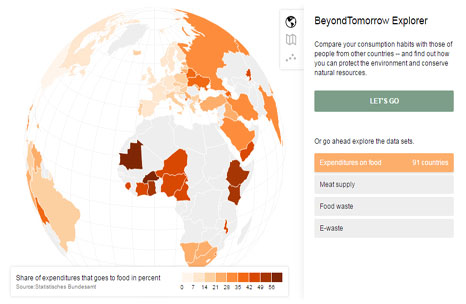
Copyright: Spiegel Online
How can freelancers join the project?
If someone has an interesting topic or a reportage around SDGs, we would love to hear about that. Then we can see if it fits in one of the focus topics which we have planned for the next months (biodiversity, inequality, labor/growth, climate/energy and education). This is what we have done with the fellow IDR grantee Jacopo Ottaviani, for instance. He sent us the materials he had been working on and we saw that his piece on the e-waste problem fitted perfectly our consumption focus. We then produced a storytelling piece around it with his texts and videos. And of course we pay regular fees to these colleagues.
Are the Global Goals of interest to German audiences?
Yes, the interest has been great. We could notice it especially in our reports on consumption and poverty. The audience is interacting with the globe,intensively reading every piece we publish and gave us really helpful feedback. We covered stories, for instance, on the different definitions of poverty and on what it means to live on a poverty standard in Germany. From our point of view, the project has taken shape very well. We have a good reach especially when the stories are connected to reader’s own circumstances of life.
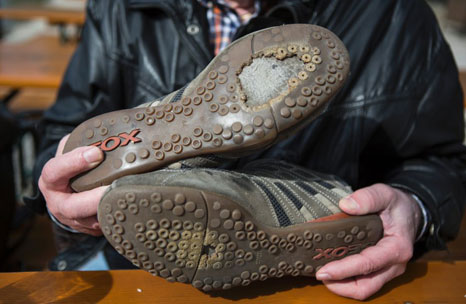
Copyright: Philipp Jeske
In your project the discussion about the SDG is done through the use of various tools, including interactive globes. Why have you opted to convey your message in this way?
We love the globe because it is such an innovative format, something absolutely new for Spiegel Online. We had the chance to develop it from scratch and to test and implement it on our website, which was quite challenging.
Combining interactive questionnaires and gamification elements, the globe provides statistics and facts around a specific topic, such as consumption or health issues. Through the globe, users can really dive deep into the datasets and at the same time compare their answers with all those statistics from different parts of the world. We also formulated the questions in such a way that people would not think about the right answer first, enabling them to have surprising insights and hints on what they can do.
Within our articles, we try to use interactive visuals in a meaningful extent because we fear that users would think ‘ok, this is just another world map’. We try to orchestrate everything in order to provide the visuals at the right point.
What were the most surprising results you have encountered so far?
The obesity in developing countries was really surprising for us. It is an interesting topic because you have so many prejudices on 0besity from beforehand. You do not think, for example, that there are so many obese children and people also in developing countries, especially in African countries. You also do not think about the problems that South Africa has with cholesterol or with different health problems connected to obesity.
The story we did on the fight against child obesity in Finland really gave us a new perspective on what industrial countries perhaps can do against obesity problems. This was quite new for us and for our readers.
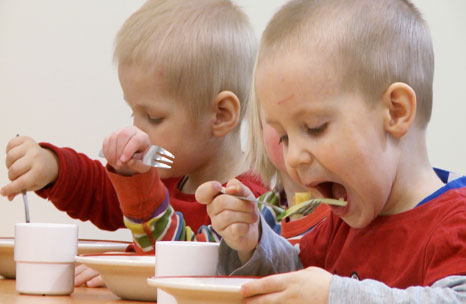
Copyright: Janita Hämäläinen
Have you had a chance to analyse how users are engaging with your content? What has the data told you so far?
We have been collecting the datasets for our interactive globes and we found out that readers are really going through nearly all the steps of these pieces. Most of them reach the end, which is really good in terms of users’ experience. Besides, we used a questionnaire to collect feedback on aspects and functionalities that should be improved.
Furthermore, our storytelling piece on poverty reached more than one million readers. On average, they stayed within the article for more than six minutes, an awesome result compared with the average time that readers spend in our regular pieces.
How has the audience responded to the Expedition Beyond Tomorrow project?
The response has been very positive so far. Especially when compared to the feedback we usually get on Spiegel Online. Within this project, we noticed that readers respond in a quite constructive way. They really want to discuss global issues and to think about what they can do on an individual level. Furthermore, they give us useful hints on, for example, interesting cases and new datasets. So obviously we are reaching a different audience, and we do this by telling our stories in a different way and making clear that this project is about changing something. And we learned that through this constructive approach we stimulate constructive feedback.
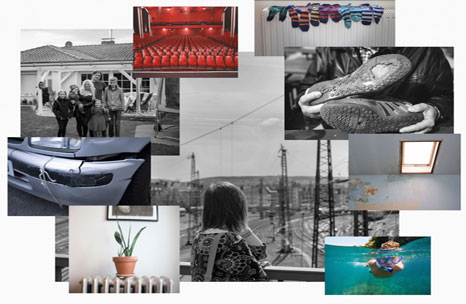
Copyright: Philipp Jeske
What do you hope the long-term impact will be for Spiegel Online?
We hope that not only our readers, but also our colleagues will afterwards have gained new perspectives on sustainability topics. That we will all have learned new ways to tell development stories and to engage with our readers.
One outcome for us is to have a new interactive format, the globe, to use after this project in the coverage of other topics. Also we have gained much more experience in collaborating with different teams and implementing partnerships inside and outside the newsroom. We think that we have already changed something here and we just want to open up the newsroom for collaborations like this afterwards. So far we really have learned many things and we will try to keep up with it.
How do you perceive media’s coverage of the Global Goals? What more can media do?
That is a really hard topic. Sustainability is very important, of course, and we all know that, but compared to things that happen on a day to day basis in times of many crises, development topics do usually not reach the same level of urgency. Besides, the quantitative impact of such stories in terms of click rates is often lower. The number of readers who are interested in development is not that high compared to those interested in catastrophes or, for example, a new alligator species found in Florida.
Of course, the bigger question behind this is: How do we measure our success? For example, could we not only relate it to the number of readers we reach, but could we also consider the intensity of those connections? In my opinion, we should focus much more on whether readers act like fans and are sharing and debating our content. If we change this mindset, constructive stories on sustainability can come into place a bit more - as well as other important topics with a rather long term perspective and a comparatively lower urgency.
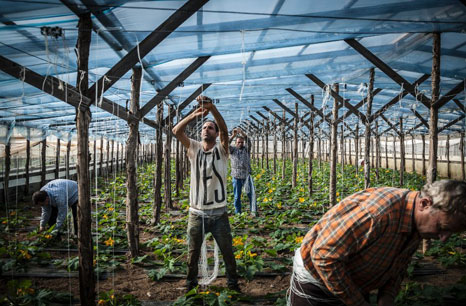
Copyright: Nicolò Minerbi
An interview by Sarita Reed, who interned at the European Journalism Centre. Sarita graduated in journalism at UFRGS, in Brazil, and holds a Master's degree in Media Culture from Maastricht University.
Cover picture Copyright: Nicolò Minerbi